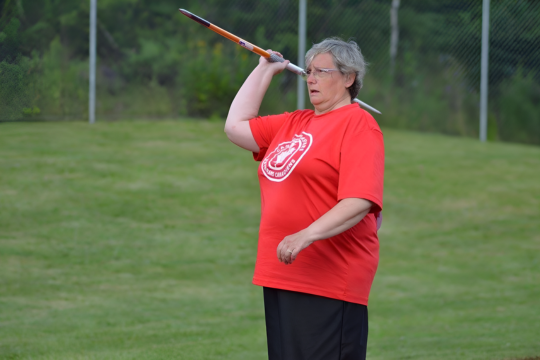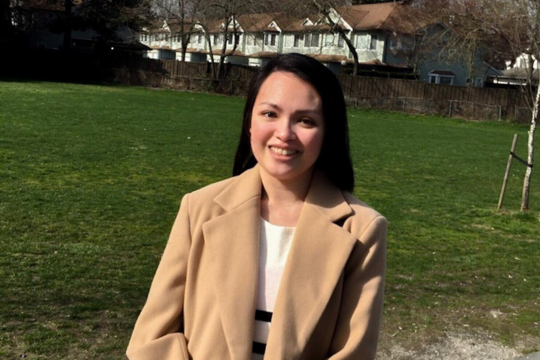
Jane Warren has volunteered for the Brain Injury Association of Nova Scotia, the Valley Community Learning Association and the Special Olympics to name a few.
If they look, and “try it,” our experts say people living with disabilities can find rewarding volunteer opportunities entirely suited to them and their skills.
Jane Warren immediately started feeling better about herself when she began volunteering. The Nova Scotia woman was just 26 in 1981 when she was in a car accident that caused multiple broken bones and gave her a traumatic brain injury. When the accident happened, she was in the prime of her life having finished her bachelor’s degree in math and having just returned from England after five years. And while her brain injury has improved over the years, when it first happened, she says she didn’t even know her own name until at least noon every day.
“My feeling of being worthy improved immensely,” Warren says about the first time she volunteered. “There was a lot more stigma around disability at that time, especially concerning brain injury survivors, and by [volunteering], I was no longer ‘bent and busted’ — or I no longer felt that way anyway, because I was being productive.”
Today, she’s a treasurer with DAWN, the DisAbled Women’s Network of Canada, which she joined in the mid-90s and which she lauds as the only national group for disabled women in the country.
“Volunteering provides company, possible friendships, networking” and the possibility of finding paid work as a result, Warren says.
April 14-20 is National Volunteer Week whose theme — every moment matters — highlights the importance of every Canadian who volunteers. Those who are living with disabilities can make important contributions, Warren says.
Sheryl Rose Newman is the volunteer management co-ordinator for The Disability Foundation, which supports six charitable societies that provide accessible and meaningful activities to those who live with disabilities. She says many of her volunteers have disabilities and contribute in all kinds of important ways. In addition, many of the staff members also live with a disability. Newman herself is in a power chair due to a spinal cord injury.
“I’ve been injured for almost 27 years now,” she says. “And one of our program managers has cerebral palsy. Our development and communications manager is also in a wheelchair. So, it’s not about our physical disabilities, it’s about what abilities we bring to the table. And that’s how we see our volunteers’ contributions, too.”

Jonalen Gamis suffered from a ruptured brain aneurysm in 2019, and advises others in her situation to look for volunteer opportunities that play to your strengths.
Jonalen Gamis, 34, was an assistant at an investment banking firm, when, as a result of the stresses of the job, she suffered from a ruptured brain aneurysm in 2019. It caused partial paralysis in her right side and she was initially unable to speak at all. Today, after three years of intensive rehabilitation and after receiving an award for her hard work at the rehab centre, she can speak again, but she has aphasia, which means she has trouble finding the right words, and movement in her right side is still difficult.
“Sometimes I see a cat and I know it’s a cat, but I say dog,” she says, adding that writing is also still very difficult for her.
She wanted to volunteer for The Disability Foundation so together, she and Newman worked on how she could best contribute. It turns out she has a passion for graphic design and is adept at using Photoshop and Canva, so she now does graphic design for the foundation.
Gamis’s advice to others who are in her situation is to look to opportunities that play to your strengths. At the moment, she is working on a logo for the Disabled Independent Gardeners Association, which is one of the organizations the foundation supports.
“If someone with a physical limitation wants to try something, we allow them to do so, and if that doesn’t work out, we will find other opportunities for them,” Newman says.
Newman says her volunteers always fill out a form that asks for a rundown of the skills they’re interested in putting to use.
“I always go to the skills they mention and then we work from there,” she says.
As such, her No. 1 piece of advice for those who may be holding back on volunteering because of a disability — “try it, and play to your strengths.”
“Try it” were also the words Gamis used when asked the same question.
And for those who do try it, the rewards are many, according to Gamis.
“It makes me feel like I’m back in the workforce,” she says. “But it’s more flexible. I can work from home and it’s not 9 to 5. It’s really fulfilling. I love it. It’s challenging, but fun.”
Jane Warren has volunteered for the Brain Injury Association of Nova Scotia, the Valley Community Learning Association, the Special Olympics, Women for Wellness, the Disabled Persons Commission of Nova Scotia, which she did for 15 years and she is a member of the Wolfville and District Lion’s Club. And those are just a few of the groups she’s worked with since 1981.
She advises would-be volunteers with disabilities to “base your volunteering efforts on your abilities, not on your disabilities.”
She’s encountered challenges because she has acquired attention-deficit hyperactivity disorder as well as mild aphasia, both of which make it difficult to carry on spontaneous or extended conversations at times. And, because of many broken bones suffered in the accident, she also walks with a limp. Further, her brain injury also means she requires a lot of sleep — more than eight hours a night — so her energy levels can be low.
For that reason, she says it’s worth considering volunteering part-time, rather than full-time. “Start slow then build up, with both time and responsibilities.”
She does stress that the rewards outweigh the challenges.
“Volunteering feels good,” Warren says. “It helps other people — and it’s helped me, too. Helping people feels good, rather than feeling useless [because you don’t] have a job.”
And, she says, volunteering gives people hope — the volunteer themselves and those who get the help, whether that’s a person or an organization.
“And it gives you a reason to get up in the morning,” she says.

